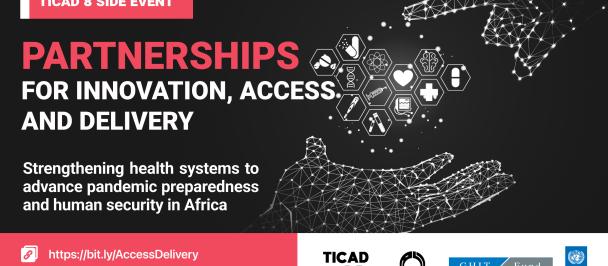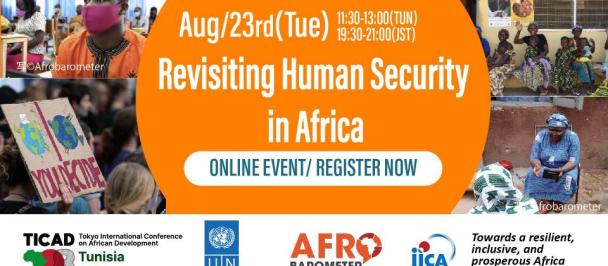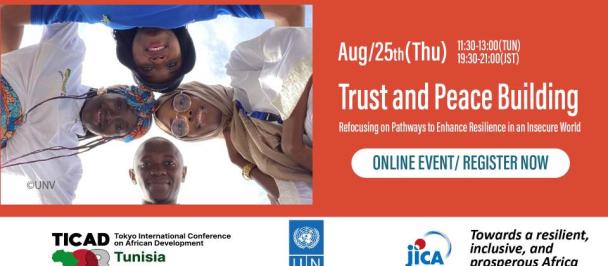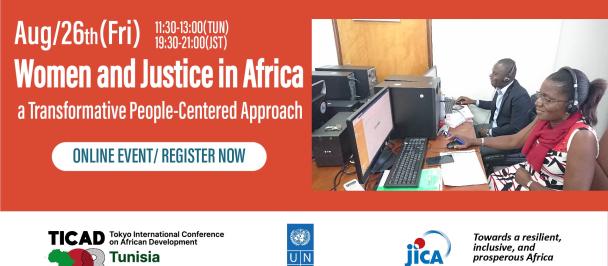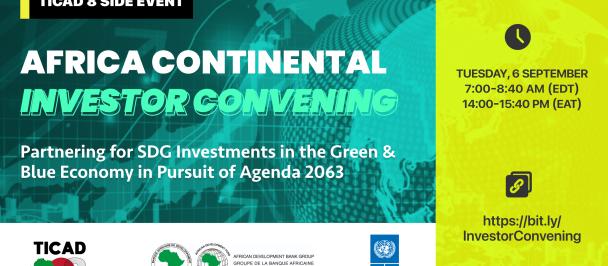TICAD 8 side event
Understanding and ensuring just energy transitions in Africa
August 8, 2022
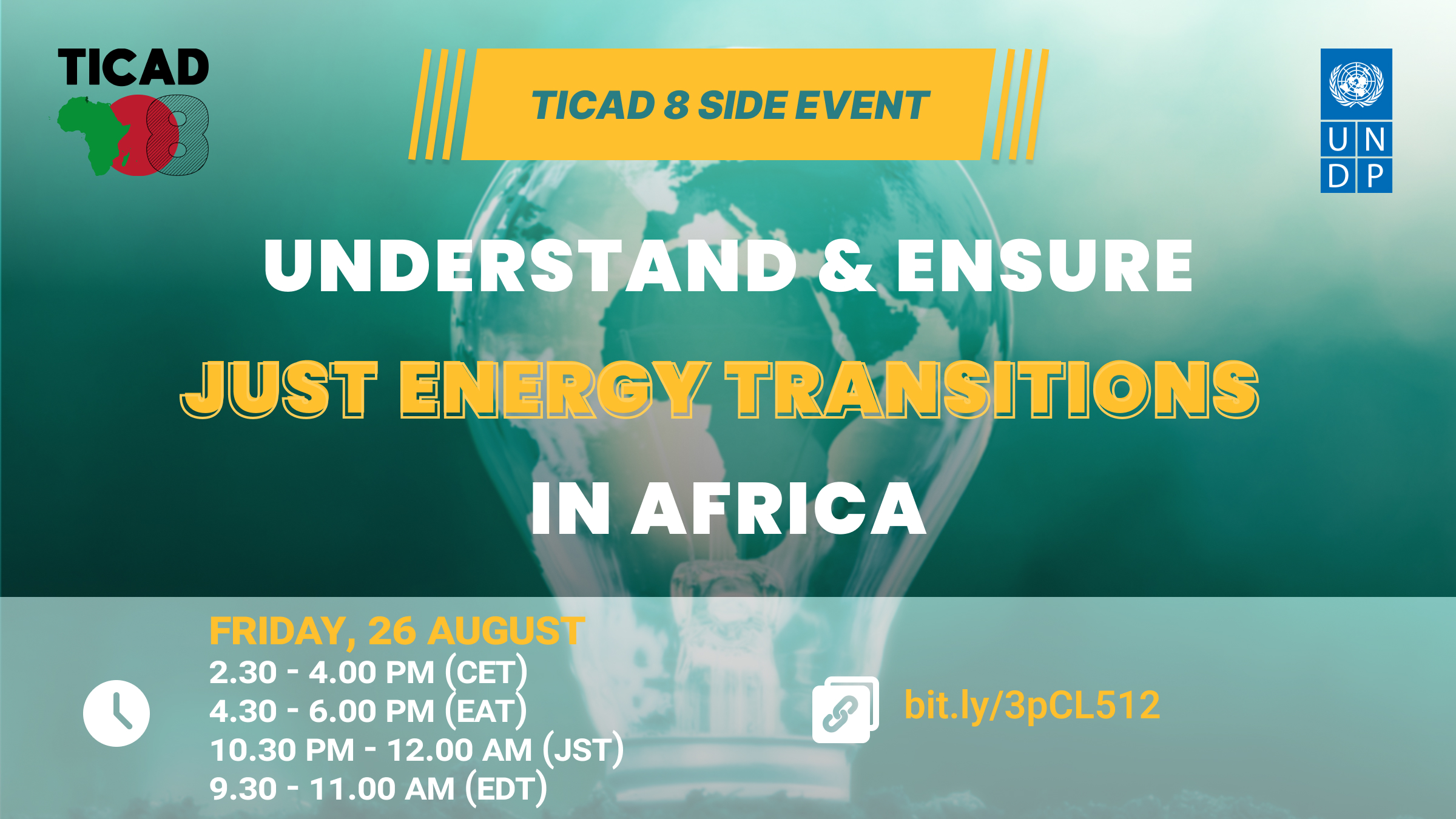
TICAD 8 side event
Event Details
9:30-11:00 EDT / 14:30-16:00 TUN / 16:30-18:00 EAT / 22:30-00:00 JST
Hybrid: Culture centre in Tunis / Online
Registration: bit.ly/3pCL512
Language: English, French
Co-organizer: Government of Tunisia, UNDP
Background
The seventh Sustainable Development Goal (SDG) calls for universal energy access by 2030. This means that urgent steps should be taken to facilitate access for the 580 million Africans without access to electricity today. However, this effort must be guided by the commitments made by African leaders during COP 26 in Glasgow in 2021.
The task of providing universal access is not made easy by the rapid population growth, which may increase from 1.4 million in 2022 to 2 million in 2040 and almost double, to 2.5 million, in 2050. With a goal of at least 75 million new access per year through 2030 to meet SDG7, further action is required.
Africa has vast resource potential in wind, solar, hydro, and geothermal energy. Hydropower also remains a cornerstone of sub-Saharan Africa’s power system, while falling costs will increasingly bring solar within reach. Africa also has abundant mineral resources essential to the production of electric batteries, wind turbines, and fuel cells, such as manganese, copper, lithium, cobalt, chromium and platinum. These form important export commodities in the global market transitioning towards zero carbon. However, the benefits Africa will derive from the energy transition will also depend on the extent to which raw material producers invest in and develop processing capacity further up the value chain.
Building infrastructure for the green energy transition will require a significant scale-up in investment. The level of investment required to achieve universal access in Sub-Saharan Africa is estimated by the IEA (2018) to be $55 billion per year. One estimate also by IEA is that annual investment in the power sector as whole needs to increase to about $100 billion a year, a four-fold increase compared to the current value. The “Financing net-zero roadmaps” (prepared for COP26) mention decarbonization investments in energy and transport in the order of $200-300 million a year in Africa over the period 2026-2050 and $100 million per year over 2021-2015 .
These are mind-boggling figures and raise the question of how such a level of investment can be mobilized. There are limits to what governments can do, given their fiscal constraints, and state-owned utilities are mostly in a weak financial position. Thus, investments in large energy projects tend to be supported by international finance and development institutions. In the power generation, larger-scale have been more reliant on public financing, while renewables have been more financed with private sources. Supportive policies and regulations, as well as maturing markets, have helped attract private sector investment into mini-grids and stand-alone systems.
Key Questions
This event will explore the following issues:
i. What would a just energy transition look like across Africa’s diverse contexts? Justice for whom? Should the focus be on accessibility? Or affordability? What are the development implications within the context of the SDGs?
ii. Which energy mix would be most appropriate for Africa’s energy transition? What are the merits and demerits of a phased transition?
iii. How would African countries finance a sustainable energy transition? What financing instruments are available to African countries? What steps could be taken to de-risk (or pool risks) for sustainable energy investments? Would regional approaches facilitate financing?
iv. What steps could be taken to ensure affordability and accessibility for traditionally marginalized individuals and communities? How could we ensure that no one or no region is left behind?
v. What role could development organizations (like UNDP, UNIDO) play in supporting and facilitating a just energy transition across Africa? How would the post-Ukraine war weakening of multilateralism affect prospects for Africa’s just energy transition?
Objective
Against this background, the high-level event will be co-organized by the Government of Tunisia and UNDP at the margin of the Eight Tokyo International Conference of African Development (TICAD8) which will be hosted by the Government of Tunisia in its capital city, Tunis, on 27-28 August 2022.
As the host of TICAD8, to be organized at this critical juncture for sustainable development of the continent amid global crisis with the impact of the War in Ukraine, COVID-19, and climate change, the Government of Tunisia will host a series of side-event to advocate for key development and investment agendas in Africa. This event is organized as part of the official TICAD8 side-event by the Government of Tunisia in a hybrid format, focusing on Just Energy Transition in Africa. The Government of Tunisia, through its Ministry of Industry, Mines and Energy, developed in July 2022 its national energy transition strategy for 2030, which guarantees the supply of clean, accessible, and affordable energy for all citizens and for economic activities focusing on Security of Supply, Decarbonization, Just Transition, and Inclusive Economic Development.

 Locations
Locations